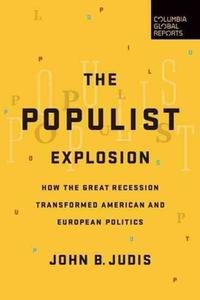
|
|
| photo: Hilary P. Judis | |
John Judis, author of The Populist Explosion: How the Great Recession Transformed American and European Politics (Columbia Global Reports, $12.99), his seventh book, is editor-at-large at Talking Points Memo and previously a senior editor of the New Republic and a senior writer for the National Journal. He has written for numerous other publications, including the New York Times Magazine, the Washington Post and The American Prospect. Judis received his B.A. and M.A. degrees in philosophy from the University of California, Berkeley. He lives in Silver Spring, Md.
The Populist Explosion went to press well before the U.S. election, which raises an obvious first question: Did you see Donald Trump's victory coming?
I wrote the book in the spring of 2016. I expected Donald Trump to get the nomination, but I didn't think he would win the election. I thought he was the one Republican candidate Hillary Clinton could beat. I didn't appreciate how deep the dissatisfaction was, particularly in the Midwest, with the Obama years and the state of the U.S. economy, and how ineffective Hillary Clinton's campaign would be.
But isn't Trump's economic populism inseparable from what you say in the book is the tendency of right-wing populism to "look down upon an out group," in his case immigrants and Muslims?
Not at all. Think of Ross Perot who, contrary to some nonsense written about him during the 1992 campaign, was not at all a racist or nativist or any of the "ists." Much of Trump's economic populism was shared by Bernie Sanders, and Trump himself picked up Sanders's language about the "rigged economy" in the fall campaign.
So why did Trump's anti-immigrant and anti-Muslim message resonate in a country that hasn't experienced the Middle Eastern and African immigration you point to as helping fuel right-wing populism in countries like France and the U.K.?
There is a big difference between anti-immigrant and anti-Muslim views. In the U.S., anti-immigrant views--and more typically, anti-illegal immigrant views--have a socio-economic basis in the huge influx since 1965, and then again since 1990, of unskilled legal and illegal immigrants from south of the border that have turned some mid-wage unionized jobs (like meatpacking) into non-union, low-wage jobs, and driven down or kept down the wages in others (like construction), and in some states caused increases in social spending and taxes. There is, for some people, a nativist, cultural dimension to their views (expressed, for instance, in English-only movements), and Trump appealed to that side in his statements about Mexican rapists or criminals coming into the U.S. Opposition to Muslim immigration dates primarily from September 11 and spikes after every terrorist incident in the U.S. (e.g., San Bernardino, Orlando). Trump's initial call for a ban on Muslim immigration fueled general anti-Muslim sentiments. You'll find a similar complicated combination of causes in Europe. On what issues do you think Trump will clash with Congressional Republicans, and how likely is he to prevail (assuming he wants to) in reshaping the GOP as a populist party?
On what issues do you think Trump will clash with Congressional Republicans, and how likely is he to prevail (assuming he wants to) in reshaping the GOP as a populist party?
In his campaign, Trump promised to protect Medicare and Social Security, and in the debates he quarreled with his fellow Republicans on this subject. House Speaker Paul Ryan wants to partially or wholly privatize these programs. The question is whether Trump will resist. And if the Republicans in the House accede to Trump's wishes to boost infrastructure spending and cut taxes, will he agree to "balance" these with social spending cuts? Or will he pursue a Keynesian economic strategy? I expect him, as he did on his choice of education secretary, to give the Republican right, and particularly the religious right, a few concessions, as with his first Supreme Court appointment, for instance. But Trump's domestic policy instincts (before he ran in the primary) were much closer to middle-of-the-road Democrats or Republicans, like former New York City Mayor Ed Koch or former New York Republican Senator Alfonse D'Amato, than to Ryan and the business conservatives. He is going to make trade-offs. I don't know which ones.
Will the Democrats simply blame Hillary Clinton's defeat on a flawed candidate's poorly executed campaign, or will they try to respond to this populist sentiment?
Many Democrats are blaming their defeat either on Clinton's campaign or on the stupidity or racism of the people who voted for Trump. There is a populist wing in the Democratic Party represented by Bernie Sanders, Sherrod Brown, Elizabeth Warren and others. I expect it to play a more important role now, but the Democrats in Congress are mainly going to be playing defense. The question may not come up until 2020 and the Democratic primaries. I thought Bernie Sanders ran a wonderful campaign, and put some ideas on the political agenda that will resonate in years to come, but that in the general election he would have had difficulty defending them, particularly the tax increases required to implement either Medicare for all or free public college.
If neither party responds effectively to the current populist explosion in the U.S. as you've described it, how likely is it that some sort of full-fledged populist party--right, left or unified--will emerge in the near term?
In the U.S., populist explosions tend to be episodic and not ongoing, and the parties rarely take one ideological form or another. Franklin D. Roosevelt's Democratic Party in 1936 was about as close as we've come to a major populist party. (The People's Party of the 1890s was influential, but didn't even get 10% of the vote.) It's hard for me to imagine the Republicans becoming, as Trump and some of his aides have suggested, a working-class populist party, which would mean jettisoning its funding base. The same applies to the Democrats, with their ties to Wall Street and Silicon Valley. So I don't have a clear idea of what is going to happen.
You devote considerable attention in the book to the rise of right-wing populism in Northern Europe. Care to predict whether Marine Le Pen's National Front in France or a populist challenger to Angela Merkel in Germany will succeed in national elections next year?
I don't do predictions well. I think Marine Le Pen would have had no chance against former Prime Minister Alain Juppé. She has an outside chance again François Fillon, another former prime minister, because he will not pick up as many left-wing votes as Juppé would have in the runoff. In Germany, Merkel and the Social Democrats have not won majorities for years, and I don't expect they will this time either, but I don't think AfD, the rightwing populist party, will challenge them on the same level, so I would expect another coalition government. But I don't pretend to have the answers here.

